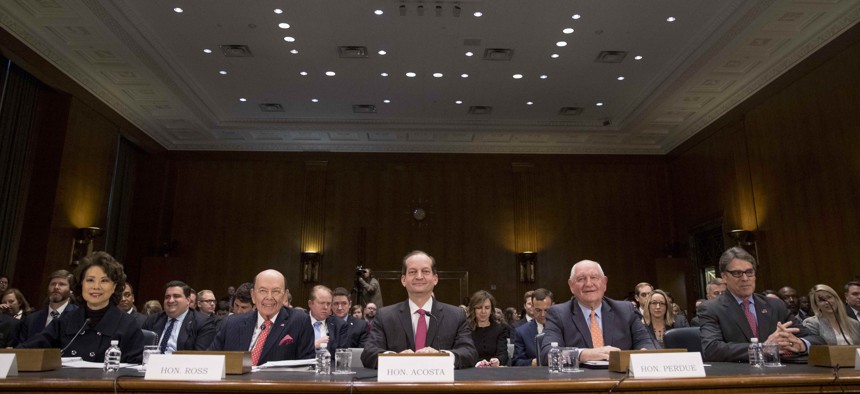5 Cabinet Secretaries Stump for Infrastructure Plan on Capitol Hill

From left, Transportation Secretary Elaine Chao, Commerce Secretary Wilbur Ross, Labor Secretary Alex Acosta, Agriculture Secretary Sonny Perdue, and Energy Secretary Rick Perry before the Senate Committee on Commerce, Science, & Transportation. AP Photo/Andrew Harnik

Connecting state and local government leaders
The officials appeared before a Senate committee. Finding money for President Trump's public works plan remains a sticking point.
WASHINGTON — Five cabinet secretaries made a case on Capitol Hill on Wednesday for President Trump's infrastructure plan, which faces an uphill path in Congress given the scarce funding to pay for it.
Uncertainty over where new federal money will come from to cover added public works spending has cast a shadow over the White House blueprint since its release last month. And this was again the case as the cabinet officials offered their testimony before the Senate Committee on Commerce, Science, and Transportation.
The secretaries on hand for the hearing included: Labor Secretary Alexander Acosta, Transportation Secretary Elaine Chao, Agriculture Secretary Sonny Perdue, Energy Secretary Rick Perry and Commerce Secretary Wilbur Ross.
“The fact that these four other cabinet members are sitting here, I think, underscores very clearly the emphasis that the president is putting on this," Perry said.
Committee Chairman John Thune, a South Dakota Republican, offered an optimistic, albeit tempered, assessment when asked about whether the Senate would make progress on infrastructure legislation this year.
“I think it’s realistic that something could happen that would constitute sort of a down payment on a bigger, more robust bill," he told reporters after the hearing. "I think the key right now is whether or not we have sufficient resources to fund an infrastructure package."
"But, yeah, I think something will move," he added.
He went on to highlight two pieces of legislation already on Congress' radar—a reauthorization bill for the Federal Aviation Administration and an automated vehicle bill that cleared his committee last year, but has hit snags in the full Senate.
Action on legislation meant to expand broadband deployment was another possibility Thune mentioned.
But he also noted that: “unless somebody's ready to bite the bullet and come up with a new funding source, there are limitations to what we will be able to do." In the Senate, it will fall to the Finance Committee to take a lead role determining the infrastructure spending the government can afford and a plan to pay for it.
Thune said nailing down new federal funds for public works spending would likely require a push by the president.
“If they really want to do the scale of what they’re talking about doing, then at some point they’re probably going to have to get behind some form of pay-fors," he said. "I think it’s going to take the president to do that. I just don’t think there’s going to be enough support up here for new revenues to do the kind of thing that they’re talking about.”
The White House proposal calls for about $200 billion of federal spending over 10 years, mostly on new grant initiatives. But it does not identify new revenues that could cover this cost.
"Given the high priority the president has placed on rebuilding America, you’d think we’d be further along in this process," Sen. Tammy Duckworth, an Illinois Democrat, said during the hearing.
"Other than releasing a 50-page proposal with a few documents, the president and his allies in Congress have failed to set the stage for any meaningful investments in our aging infrastructure," she added.
Duckworth went on to press the secretaries on whether their departments had analyzed or considered potential revenues that could support the federal share of Trump's proposal.
"As for pay-fors, I agree with you, that is a very difficult question," Chao said in her response. "As of now, the good news is, everything is on the table. And we look forward to working with the Congress."
"I don't think that's quite an answer," Duckworth replied.
Republicans lawmakers and the secretaries zeroed in on overhauling permitting and project approval processes as a way to cut costs and speed-up projects. This is another core element in Trump's plan.
“One of the most important things that you will do as a governor, and I would suggest as a senator who oversees agencies, is in the thoughtful addressing of permitting,” said Perry, who served previously as the governor of Texas. “Permitting and regulations, I would suggest to you, affect the bottom line even more than taxes do," he added.
Sen. Jim Inhofe, an Oklahoma Republican, struck a similar tone.
“The impediment to more energy infrastructure is existing government regulation and red tape dragging out the completion of needed projects,” he said.
Tolling, rural broadband deployment, and the financial limitations states and localities face when it comes to raising money for projects were among the other issues that came up Wednesday.
Ross described some of the possible ideas the Commerce Department has in mind for a $20 billion program for "transformative" projects that Trump has proposed. These included satellite-based broadband, upgraded facilities for spacecraft, augmented reality to improve city congestion and new dredging technologies for ports.
Thune emphasized that the type of infrastructure package under discussion is more than a highway bill and urged building on successful federal programs, particularly those for project financing.
“Both sides want to make our existing programs work better," he said. "Both sides can come together on this and it can happen this year."
This post has been updated.
Bill Lucia is a Senior Reporter for Government Executive's Route Fifty and is based in Washington, D.C.

NEXT STORY: Senator Casts Doubt on Chances for New Infrastructure Grant Programs





